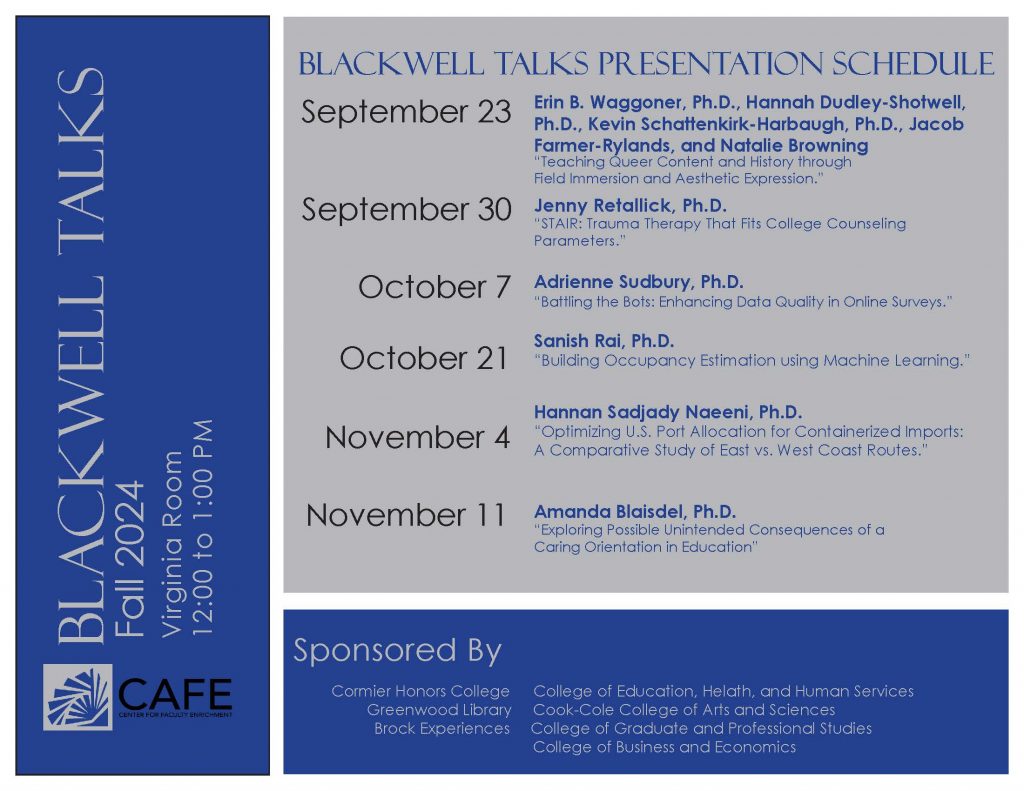Categories
- "about me" (0)
- #HookedOnTroutYNP (0)
- #jointhestampedeLU (1)
- #LUBlazin2 (1)
- #prospectus (0)
- #whostheweatYNP (1)
- – "It is during our darkest moments that we must focus to see the light." -Aristotle (1)
- 1.) Find topic (1)
- 2011-2012 (24)
- 2012-2013 (25)
- 2013-2014 (26)
- 2014-2015 (28)
- 2015-2016 (31)
- 2016 election (0)
- 2016-2017 (22)
- 2017-2018 (27)
- 2018-2019 (22)
- 2019-2020 (23)
- 2020-2021 (25)
- 2021-2022 (21)
- 2022-2023 (20)
- about the author (1)
- About Us (10)
- Academic Affairs (14)
- advice (0)
- Alerts (6)
- Alumni Relations (3)
- Analysis (1)
- art (0)
- Articles (3)
- artifacts (0)
- Arts & Entertainment (0)
- Assessment (0)
- Athletics (4)
- Authors (1)
- Barcelona (5)
- Bilbao (4)
- bio (0)
- Biography (5)
- Biological & Environmental Sciences (10)
- blog (0)
- Blog Post (0)
- Blog Posts (1)
- books (1)
- Buzz (4)
- CAFE (2)
- Career Services (9)
- Category: Parents In a Pandemic (1)
- Center for Academic Success (3)
- Chemistry and Physics (9)
- Chinese Dream (1)
- civility (1)
- CLASP (2)
- Classwork (8)
- Clinton (0)
- Closed Positions (245)
- CNN (0)
- College of Business & Economics (0)
- College of Education & Human Services (145)
- College of Graduate & Professional Studies (49)
- Coming of Age (1)
- comm341 (0)
- Communication Sciences & Disorders (115)
- Communication Studies (2)
- Communication Studies & Theatre (5)
- Company news (1)
- Comparative Research (1)
- Computer Science (1)
- Conclusion (0)
- contact savanna (1)
- contemporary-romance (1)
- Cook-Cole College of Arts and Sciences (25)
- Cormier Honors College (4)
- cost (0)
- Counselor Education (50)
- Culture (1)
- D.C. Dispatch (2)
- Daily Highlights (12)
- Dalton Highway (2)
- Darby Italys Adventures (6)
- Databases (1)
- DC (0)
- Dear Reader (1)
- debates2016 (0)
- DEC (10)
- Democracy (0)
- diversity (1)
- Documents (2)
- dystopian/(post)apocalyptic (1)
- Early Childhood Development Initiative (1)
- Educational Leadership (8)
- EH&S (1)
- election (0)
- election2016 (0)
- Elections (0)
- Elementary Education (3)
- Elementary Writing (3)
- English (14)
- English & Modern Languages (27)
- English And Modern Languages (5)
- Enrollment Management (1)
- ePortfolio (1)
- ethical dilemmas (1)
- Event (4)
- Experiences (1)
- Faculty News (1)
- Faculty News Notes (13)
- Fall Semester 2018 (5)
- Fall Semester 2019 (5)
- Farm Blogs (2)
- fashion (0)
- Featured (12)
- find info (1)
- Find Literature on Topic (1)
- Find themes in literature (1)
- Find Topic (1)
- First Year Experience (6)
- Foundation Courses (1)
- Foundation Level Requirements (2)
- Francophonie (1)
- Freshman Year (1)
- Freshman Year 2 (1)
- fun (1)
- Gardiner (8)
- GenED Courses (1)
- General (1)
- General ED Goals (1)
- Genres (5)
- Global Communication (1)
- Goofy (1)
- Graduate Assistantships (49)
- Graduate Spotlight (3)
- Graduate Travel (2)
- Graduate Writing Center (3)
- Granada (36)
- Graphic Design (0)
- Health & Physical Education (17)
- Historical Fiction (1)
- History, Political Science, & Philosophy (3)
- hofdebate16 (0)
- Hofstra Debate (0)
- Hofstra University (0)
- Home (1)
- Honors Courses (0)
- Honors Pillars (1)
- Identity (4)
- Identity Blog (1)
- Impressions (6)
- Infant and Toddler Connection (1)
- Instagram (0)
- International Affairs (5)
- Intro (1)
- introduction (2)
- Introduction to Digital Writing (2)
- Iran (0)
- Islamic Republic (0)
- Jackson (10)
- jill stein (0)
- journal (0)
- journalism (0)
- Latest Update (2)
- learn info (1)
- Levels of Processing Model (1)
- LGBTQ+ community (1)
- Liberal Studies (4)
- Life-STEM (1)
- Longwood LIFE (1)
- Longwood Recovers (1)
- LUVPDebate (3)
- LUYNP (0)
- mainstream (1)
- Math (1)
- Mathematics & Computer Science (10)
- May 2023 (1)
- MBA Program (16)
- Misc (3)
- Miscellaneous (1)
- Movie (1)
- music (8)
- Neurostudies (2)
- New Books (20)
- New CDs, DVDs, & Media (35)
- Nursing (3)
- Office of Diversity & Inclusion (0)
- Office of Fraternity & Sorority Life (2)
- Office of Student Affairs (16)
- Office of Student Research (3)
- Office of Student Success (1)
- On the Campaign Trail (0)
- OPEN positions (96)
- openlearning (3)
- Opportunities (5)
- Oral History Community (2)
- ORC (6)
- organize and summarize info (1)
- OSR Activities (32)
- Past Posts (1)
- Perspective Requirement (1)
- Persuasion Theory (2)
- Photo (0)
- Photo Essay (1)
- photography (2)
- photojournalism (0)
- Photos (1)
- photoshop (0)
- Pillar Courses (4)
- Pillar Requirements (6)
- Places (14)
- plastic planet (1)
- Posts (13)
- Posts For Class (1)
- presidential election (0)
- price (0)
- professional development (0)
- Professional Portfolio (7)
- Professional Studies (13)
- Promotional (1)
- proposal (1)
- Psychology (0)
- Published Posts (4)
- race (0)
- Reading Literacy and Learning (2)
- Reading, Literacy, & Learning (12)
- reflections (6)
- Registrar's Office (3)
- Reminders (1)
- Resume (2)
- Reviews (1)
- Rhetoric (13)
- Rhetorical Criticism (5)
- Santiago de Compostela (4)
- School Librarianship (9)
- Science Fiction (1)
- self care (5)
- Services (6)
- Sevilla (4)
- short-stories/anthologies (1)
- Social Media (2)
- Sociology (1)
- Sociology, Anthropology, & Criminal Justice Studies (2)
- Special Education (1)
- Spring 2017 (1)
- Spring Semester 2019 (6)
- Spring Semester 2020 (6)
- Stewardship (0)
- Strategic Operations (4)
- Student News (2)
- Student Resources (1)
- Student Union (5)
- Study Abroad (4)
- Summer Internship 2016 (0)
- support (0)
- System Alerts (2)
- System Updates (9)
- Table of Contents (1)
- Technology (1)
- theatre (2)
- Travel (1)
- Travel Experiences (1)
- Trump (0)
- Uncategorized (2,349)
- UR Grants (1)
- UR Programs (1)
- USA (0)
- VA Beach (0)
- Valencia (3)
- vermin supreme (0)
- Video Game Essays (1)
- Video Series (4)
- Volume 8 (29)
- voter (0)
- Voting (0)
- VSRA (12)
- Washington DC (0)
- welcome (0)
- What's New (55)
- Year In Review (1)
- Yearly Updates (1)
Sitewide Tags
- 2011-2012
- 2012-2013
- 2013-2014
- 2014-2015
- 2015-2016
- 2016-2017
- 2017-2018
- 2018-2019
- 2019-2020
- Academic Affairs
- Audrey Church
- CBE
- CCCAS
- CEHS
- CGPS
- COUN
- CSD
- DEC
- Elif Guler
- English
- full-time
- graduate
- HPE
- MBA
- onthecampaigntrail
- part-time
- progress
- rhetoric
- SHAV
- SHAV2016
- SHAV2017
- SHAV Conference
- SLIB
- speechlanguagepathology
- student affairs
- travel
- tutorials
- VAASL
- VAASL2016
- VAASL 2016 Conference
- VAASL 2018
- VAASL Conference
- VSCA
- VSCA 2018
- VSRA
Archives
- November 2025
- October 2025
- September 2025
- August 2025
- July 2025
- June 2025
- May 2025
- April 2025
- March 2025
- February 2025
- January 2025
- December 2024
- November 2024
- October 2024
- September 2024
- August 2024
- July 2024
- June 2024
- May 2024
- April 2024
- March 2024
- February 2024
- January 2024
- December 2023
- November 2023
- October 2023
- September 2023
- August 2023
- July 2023
- June 2023
- May 2023
- April 2023
- March 2023
- February 2023
- January 2023
- December 2022
- November 2022
- October 2022
- September 2022
- August 2022
- July 2022
- June 2022
- May 2022
- April 2022
- March 2022
- February 2022
- January 2022
- December 2021
- November 2021
- October 2021
- September 2021
- August 2021
- July 2021
- June 2021
- May 2021
- April 2021
- March 2021
- February 2021
- January 2021
- December 2020
- November 2020
- October 2020
- September 2020
- August 2020
- July 2020
- June 2020
- May 2020
- April 2020
- March 2020
- February 2020
- January 2020
- December 2019
- November 2019
- October 2019
- September 2019
- August 2019
- July 2019
- June 2019
- May 2019
- April 2019
- March 2019
- February 2019
- January 2019
- December 2018
- November 2018
- October 2018
- September 2018
- August 2018
- July 2018
- June 2018
- May 2018
- April 2018
- March 2018
- February 2018
- January 2018
- December 2017
- November 2017
- October 2017
- September 2017
- August 2017
- July 2017
- June 2017
- May 2017
- April 2017
- March 2017
- February 2017
- January 2017
- December 2016
- November 2016
- October 2016
- September 2016
- August 2016
- July 2016
- June 2016
- May 2016
- April 2016
- March 2016
- February 2016
- December 2015
- November 2015
- August 2015
- April 2015
- March 2015
- February 2015
- August 2014
- May 2014
- January 2014
- September 2013
- August 2013
- April 2013
- March 2013
- December 2012
- November 2012
- June 2012
- May 2012
- March 2012
- January 2012
- November 2011
- October 2011
- September 2011
- July 2011
- May 2011
- April 2011
- March 2011
- February 2011
- January 2011
- December 2010
- October 2010
- August 2009
Meta
Homecoming is back Nov. 8-10, with an encore of Longwood’s newest tradition
Longwood’s newest Homecoming tradition is back for the second year, and it’s specifically for parents, alumni and friends of the university!
Longwood has again partnered with nearby Sandy River Distillery to create a limited edition single-barrel bourbon called 1839 Collection—and bottles go on sale this month, just in time for Homecoming & Alumni Weekend on Nov. 9!
Parents are encouraged to attend Homecoming and experience Lancer spirit firsthand—tailgating, basketball games in the Joan Perry Brock Center and the chance to meet some of your student’s friends. Find out more and register here.
Now back to the 1839 Collection. There are fewer than 800 bottles available for sale this year, but you can be among the first to know when Sandy River Distillery opens sales. Just enter your information at go.longwood.edu/1839Collection, and we’ll let you know the minute it goes on sale!
Sandy River is a locally owned and operated distillery that is part of an outdoor adventure center complete with a ropes course, bike and boat rentals, and log cabins and glamping tents available for rental. It was important to us to partner with a local business on this project, and we found really natural partners in Mark and Candice Smith, who own the distillery and adventure center. They are just a five-minute drive from campus, so you might want to add them to your list of destinations the next time you’re in town!
If you purchase 1839 Collection, there are three ways to get your bottle:
- Pick up at Longwood’s Homecoming & Alumni Weekend pregame tailgate event on Nov. 9 (preferred)
- Pick up at Sandy River Distillery
- Ship within Virginia
Note: There is no shipping outside Virginia at this time.
If you have questions, please contact 1839Collection@longwood.edu.
Here’s a toast to Longwood and our families!
—Longwood Marketing, Communications and Engagement
Posted in Uncategorized
Comments Off on Homecoming is back Nov. 8-10, with an encore of Longwood’s newest tradition
Weeks 3-4 in Nepal – The Terai & “See you again”!
A small, lanky chicken scurried past my ankles as yet another droplet of sweat slipped past the edge of my eyebrow and fell into the silty dust beneath my feet. I glanced up and to my left as our host and educator for the day, Ranjana Lamsal, spoke with Parvati Mahato, the woman we had traveled by van over long, bumpy roads to visit. Parvati nodded and replied softly to Ranjana, gently bouncing her young, sleeping daughter in her arms as she spoke. I watched her multitask effortlessly–soothing her daughter as she recounted the story of her family’s dealings with a migration agent who ran away with over half of her family’s savings and forced her husband, Om, to start his foreign employment process from scratch for the second time in the span of a few months. Clearly, performing multiple forms of emotional labor at once was not a novelty for her.
When we arrived at her house, Parvati and her mother–a beautiful, wise-looking older woman with long silver hair and an analytical gaze–dragged as many plastic lawn chairs as they could find out of their house, along with one of the children’s beds, just so that we would have a place to sit for our meeting. I shifted uncomfortably on the bed’s hard, hand-carved wooden frame and taut nylon webbing, temporarily distracted by my mental image of how difficult it would be to sleep on the webbing’s rough knots every night.
The experience of visiting Parvati and hearing her story first-hand, sitting on one of her children’s beds in her yard in rural Nepal, is one that will stay with me for the rest of my life. While we were on our excursion to the Terai, a rural region in southern Nepal, my peers and I were able to visit the homes or neighborhoods of four individuals who had opened cases with the local government’s Migration Resource Center (MRC) to try to achieve justice for exploitation that themselves or their family members had faced/were facing as migrant laborers in Gulf Cooperation Council member-countries. The importance of sharing such personal settings with the individuals and families that we were lucky enough to listen to cannot be undermined–being physically present the places where they carried out their daily routines contextualized their stories and made the experience of learning from our speakers hyper-real for me.
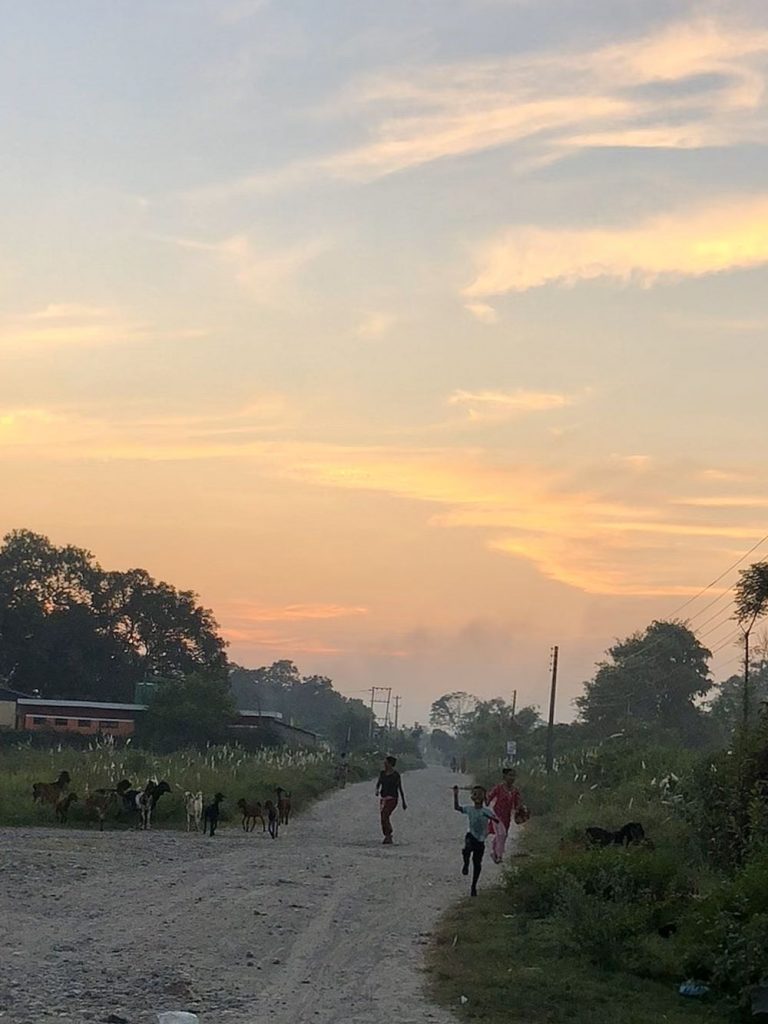
Interacting with each individual we visited–all of them survivors of structural violence at the hands of the Nepali state, the government’s of GCC member-countries, and all the rich politicians in between–through normal conversations was also extremely effective for informing us about the day-to-day realities and consequences of undergoing struggles related to foreign employment within the Nepali/Eurasian/international system. It was because of the personal nature of those conversations that I began to understand what it looks and would feel like day-to-day for a single mom to raise her children without her husband, while he faces inhumane working conditions in Dubai, Qatar, etc. I was able to visualize the daily morning routine: preparing food, waking the children, getting them ready for school and/or work, feeding the animals, cleaning up the house, trying to get in touch with the relative abroad to check on them and receive information about how to advocate for them from thousands of miles away, and then making more phone calls or a long visit to the RMC to pass along information from the relative to case workers. If we hadn’t been sitting there in Parvati’s yard though, face-to-face with both the joy and struggles of her life, I don’t think I would have gained the same understanding.
Another thing that became abundantly clear to us through our site visits in the Kawasoti province of the Terai and beyond was the imperativeness of the Safer Migration (SaMi) program and the presence of the MRC in each district of Nepal. At one point during our site visits, Ranjana looked at each of us and said, “Now you see how important it is that we are here. If SaMi wasn’t here, who would advocate for justice for these families? It wouldn’t happen.” That concept stayed with me for the entire rest of the day and throughout the next as well, when we went to visit the local government office of Kawasoti. Our presentation experiences in the government buildings we visited in Terai were also highly informative, but they felt much staler than our interactions with the individuals and families that Ranjana introduced us to during our site visits.
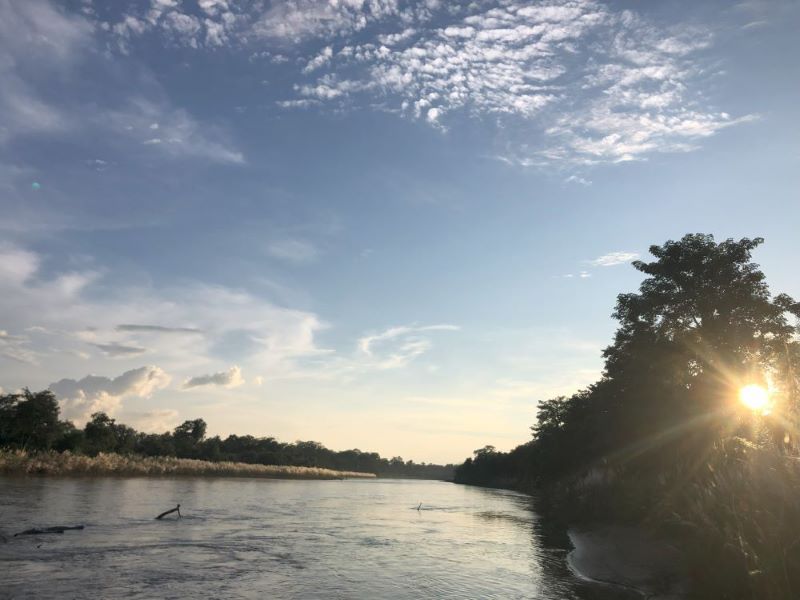
Prior to those interactions, when we were listening to representatives of the MRC speak, I was more passively interested in what the speakers were talking about. The presentation took on a completely different meaning, however, when MRC clients began climbing the stairs and poking their heads into the room where we sat, asking for directions to one office or another to handle cases, inquire about services, look over documents, etc. The faces that appeared in the doorway were the reason that we were there- they were the manifestations of the knowledge and data being served to us on projected powerpoint slides, and it was only after I allowed myself to realize the weight of that connection that I became fully invested in what was going on around me.
Similarly, I don’t think I would have gotten nearly as much out of our visit to the Kawasoti municipality’s local government office had I not met Ranjana’s clients at their homes the day before. Honestly, the Kawasoti judicial committee presentation brought up a lot of anger and frustration for me, and I think I was feeling that way because I had fresh conversations with local people spinning around inside my head and providing personal, anecdotal context to the information we were being fed about Nepali policy and government structure. The Deputy Mayor explained the limitations of the power of local governments as that applies to bringing justice to labor migrants whose perpetrators flee to different provinces or countries, about her stance on divorce and the state’s involvement in domestic affairs, about the complexities of the civil vs. criminal case divide in terms of how the state can allocate resources to survivors, etc.
As she spoke, all I could think about was Parvati’s face as she held her daughter–the shadows under her eyes and the determination in the way she clenched her jaw. I thought of the young boy whose father committed suicide after returning from working abroad–I remembered the boy’s quiet resilience, how his life and mind have forever been altered by the struggles he inherited from his father during his early teenage years. How could the Deputy Mayor have such an honest, comprehensive understanding of the issues faced by this extremely vulnerable population in her community and seem to relay this information to us as if it was the most normal thing in the world? In the moment, I knew my anger was directed at the wrong person, the wrong place, but I couldn’t help but want to stand up and shout, “Yes! And do you have any idea how these policies are inflicting violence upon the people your government claims to represent and care for?”.
Once I had calmed down enough to think critically again, I eventually accepted that the Deputy Mayor must care deeply for her community to do the work she does, and that she and her colleagues are helping migrant workers in whatever ways they reasonably can–it’s the dynamics of the Nepali state that do not allow local governments to take much direct action, not individual negligence. I thought to myself, of course the Deputy Mayor and her colleagues can feel the pain of their community, and perhaps the frankness of her communication may just be an indicator of how long she has had to grapple with this kind of knowledge and how she has learned to cope with it.
It’s still frustrating that Nepali’s local governments are not able to do more to help prevent further harm in the future, but it’s thanks to women and workers like Ranjana that labor migrants at all stages can have some hope for justice and safety while abroad. Balancing the need for further progress with the ability to have gratitude for the social resources that already exist in rural Nepal is a tricky line to walk, and it’s a line I found myself walking every day in the Terai. My gratitude for being there and having the opportunity to learn from so many people with such different life stories is clear and undeniable, though–this experience has changed my worldview profoundly, and it is one that I’ll never forget.
– – – – – – – – – – – – – – – – – – – – – – – – – – – – – –
As I stepped through the dark wooden doorway, I wasn’t sure what to expect–Kat and I had been anxiously awaiting seeing this room of our homestay house for weeks, as it was one of the only rooms we hadn’t yet explored and we knew that it housed beautiful artwork. Nothing could have prepared me for the depth, detail, intricacy, and delicate beauty of the statues that arched and sat and danced and stomped before me, though. They looked so real, so divinely powerful, as if they might unfreeze and wield their mightiness upon us at any given second. Kat and I were mesmerized, so much so that we momentarily forgot that the quiet, humble man with endearing crow’s feet who padded quietly into the room behind us had created these figures with a few simple tools and deft skill of his calloused hands.

These were the kinds of moments that Kat and I found ourselves reflecting upon days later as we sat on yet another bougie Qatar Airways flight, sad to be leaving Nepal and excited for what lay ahead of us in Jordan. Before boarding, Yanik and his team had organized a lovely, tear-jerking final dinner with our homestay families. We all met at a cute cafe’s outdoor garden, and we exchanged gratitude and memories and more than a few glasses of wine underneath the twinkling party lights that were strung above us. Our host dad, Krishna, had a way of making Kat and I laugh that was totally unique–somehow, dad jokes are dad jokes anywhere in the world, and he definitely capitalized on his final opportunity to share them with us.
In our conversations about all that we had learned during our brief time in Nepal, I found myself thinking about how in a past life, I could have been like any of these wonderful people that I had met halfway around the world, and they could easily have been like me. It was a unifying thought–the comfort that we all share our humanity and the capacity to empathize with one another across our differences is profound.
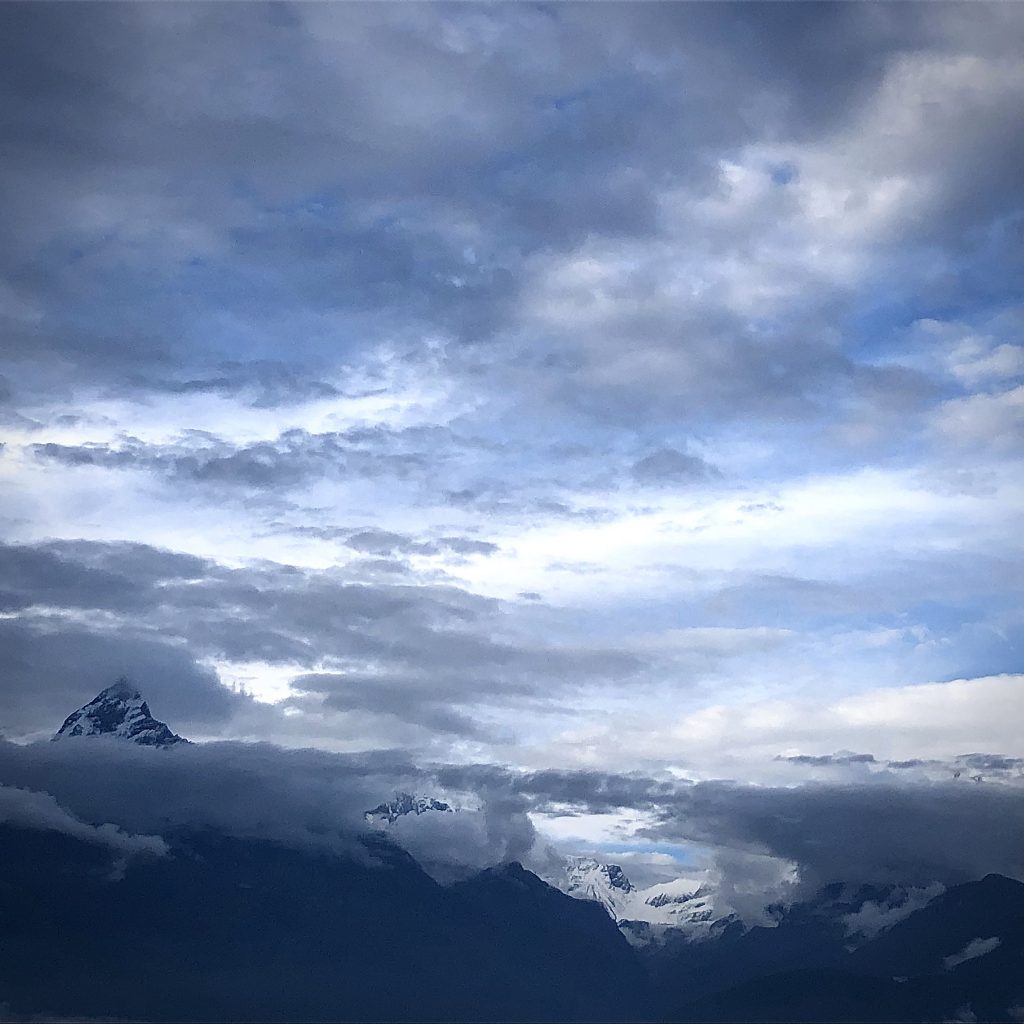
I also found myself remembering our 22-hour bus ride back from Pokhara, a mountainous city full of beautiful cafes where gangsters launder their money and where ferryman spend their days paddling people across the city’s yawning lake.
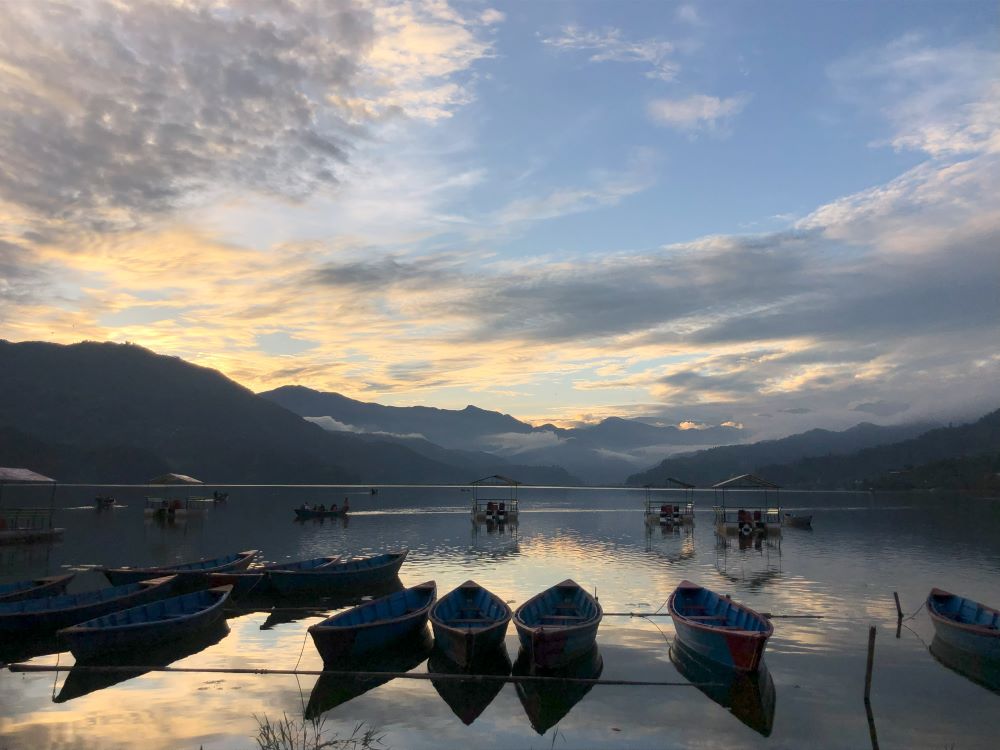
My cohort ended up spending one more day than originally planned in Pokhara due to the devastating flooding that recently tore through the floodplains of Nepal and tore up the country’s roads, causing landslides and traffic and slowing down the provision of essential disaster-relief resources to affected areas. The flooding was severe–Nepal received half of it’s annual rainfall in two days, and despite the fact that government officials had been warned ahead of time of the impending storm, preventative measures were not taken to protect the lives and livelihoods of the populations most at risk. In recent years, working class communities (often comprised of daily-wage workers) have settled in haphazardly developed housing on the banks of the Bagmati River and its floodplains. This is the only place that many of these families can afford to live, and they suffered and lost the most at the hands of the recent flooding.
My cohort and I were extremely lucky, as were our host families in Patan, to have our lives and homes left intact in the wake of the floods. My peers and I did suffer, however, when we were confined inside our tourist bus for 22 hours on the trip back from Pokhara due to landslides, Indian drivers in massive, colorful trucks (colloquially known as “tippers”) asleep at the wheel with their engines cut off in the middle of the road, and a mass exodus of people trying to reach family members in need or on a journey to find refuge on higher ground. The journey was brutal- the day before, we had geared up for an eight-hour bus ride, but nothing could have prepared us for the claustrophobia, desperate humor, waves of helplessness, and ultimately, the strong group solidarity that we encountered while we were trapped on that bus.
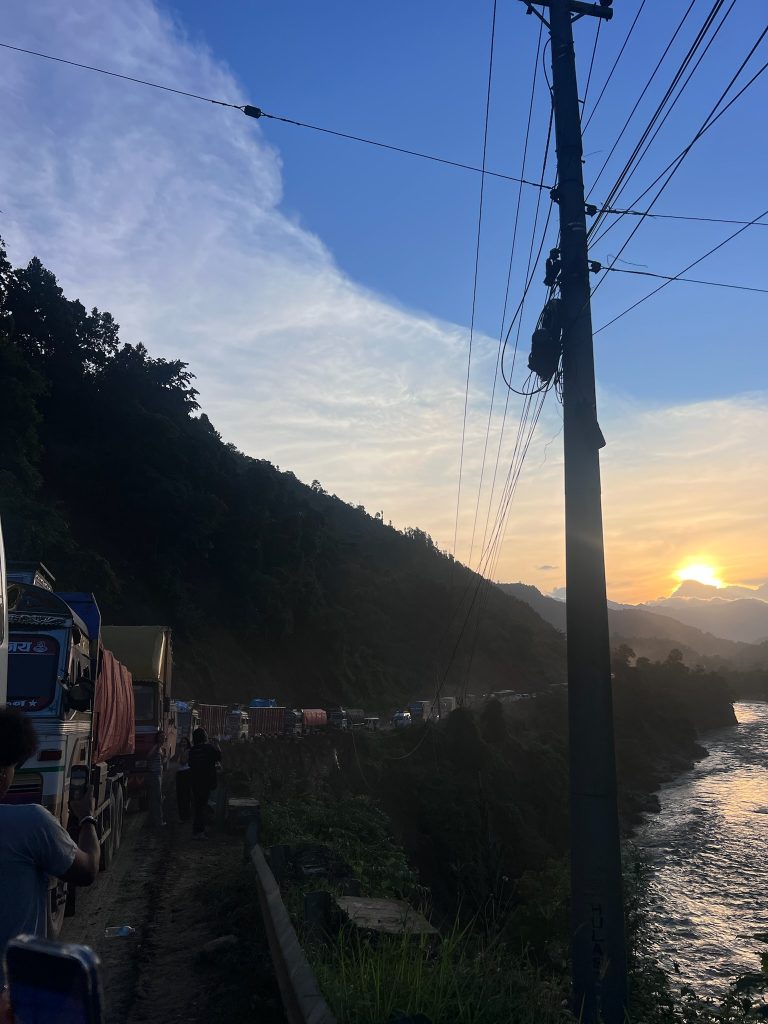
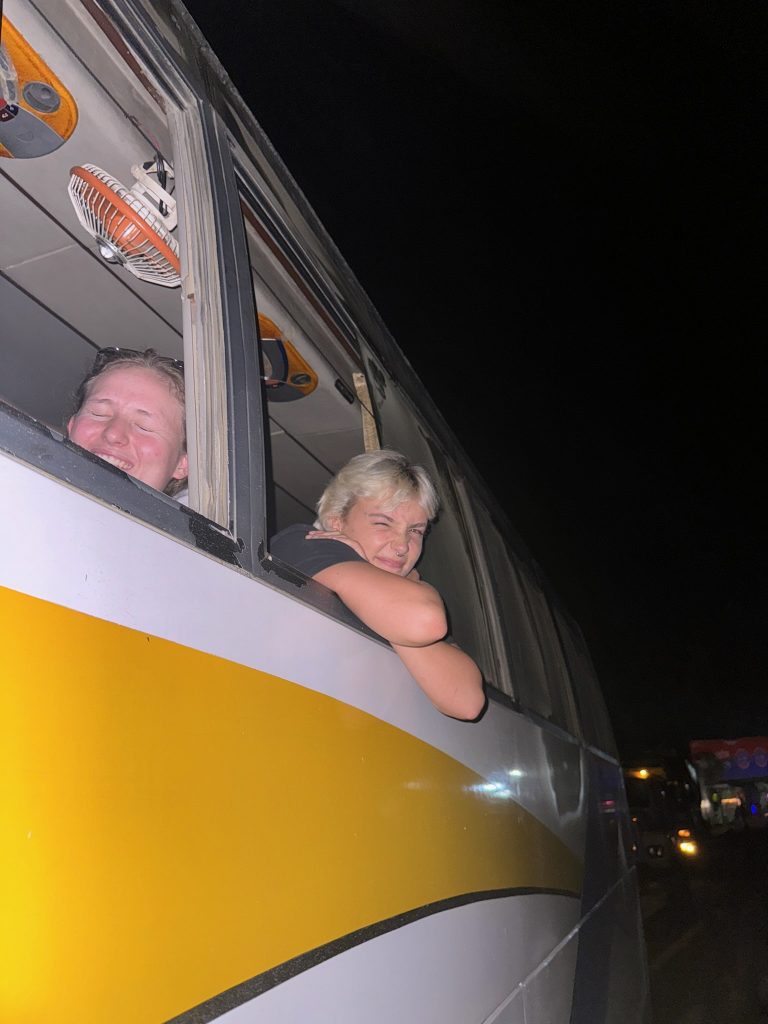
Once again, Krishna set the absolute highest standard for the seriousness with which he took our collective safety and wellbeing as a member of our student support staff, but also as a true friend of us all. During many occasions in the wee hours of the morning, when we were stuck at absolute standstills due to the tipper drivers decisions to take naps in the middle of the road, Krishna got out of the bus and banged on the sides of the trucks to wake the drivers so that we could move forward. He would then lead us ON FOOT through a maze of moving/non-moving vehicles with haphazard headlights pointing this way and that until we had made it clear to the other side of the blockade. This process definitely put him in harms way, as many of the drivers were barely awake, but Krishna showed no fear- he was like Moses, parting the tipper-sea for us. When he was back on the bus, he made sure to check in with everyone and provided us with water to keep us hydrated, dark humor to keep us smiling and grounded, and hugs when we started to go a little cray. He is such an awesome human being, and many tears were shed when we were forced to say “see you again”. I can’t wait for my post-undergrad return to Kathmandu to reunite with him and my host family, and to send the Annapurna circuit as a team with him and Ellie and Sarah!
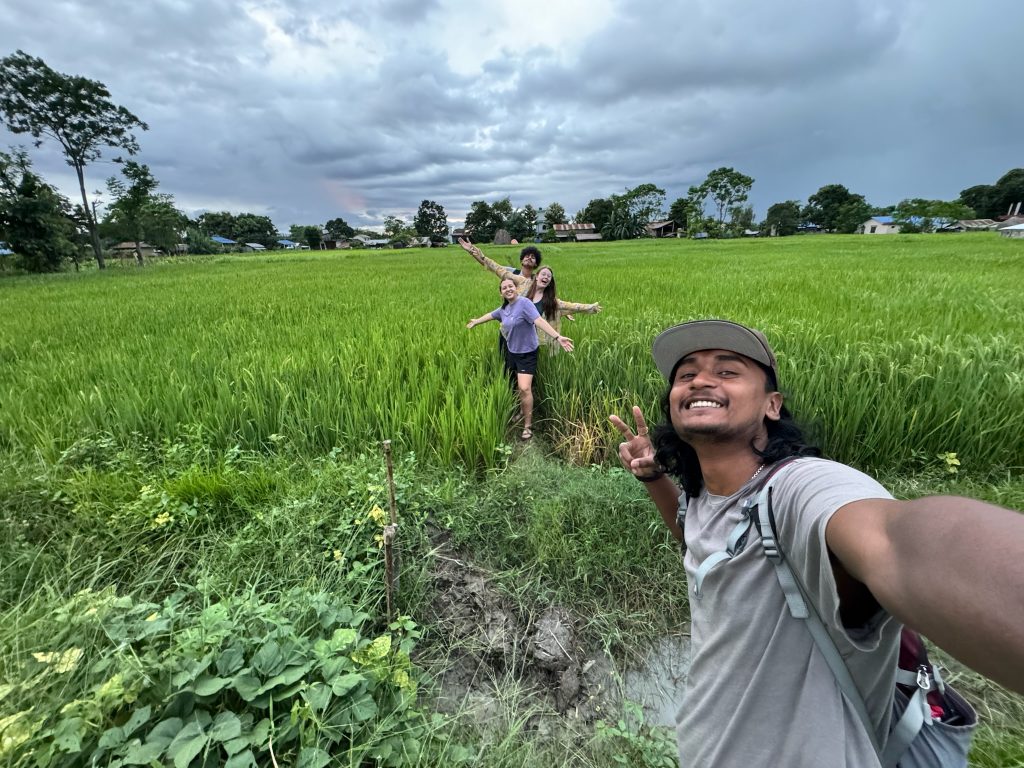
There were so many epic, bonding moments, so many life-changing conversations had between me and Krishna and Nirvana and Laboni and Yanik and my peers and our guest-lecturers and our host families, so many beautiful sunrises and evening walks back home from our beloved classroom space- It would take years to recount all that has happened in the last month to the degree that these experiences deserve, but alas, time marches on and so do I! As I sit here writing this from our hotel in Jordan, I must now begin to chronicle the incredibly different, equally fascinating and growth-inducing experience we have already begun to have here. In Nepal, they do not say goodbye- only see you again! Now we have said Salaam Alaikum to Jordan… more on this soon.
Posted in Uncategorized
Comments Off on Weeks 3-4 in Nepal – The Terai & “See you again”!
Q1. What do the 7 competencies have to do with careers
1. Critical thinking, the ability to problem solve
2. Professionalism, acting as one would in the appropriate setting
3. Communication, being able to listen to someone and incorporate that into the work
4. Teamwork, working well with others and holding each other accountable
5. Leadership, taking initiative and distributing tasks effectively
6. Technology, having the appropriate skills for the job and being responsible
7. Equity and Inclusion, being fair
Personal Examples
- I demonstrated critical thinking by creating different ways to get a range cars to different sublet shops when working at Auto Connection.
- I demonstrated professionalism by showing up to school and work on time and completing my tasks, sometimes beyond my tasks.
- I demonstrated communication by clearly voicing my boundaries in the workplace enviroment.
- I demonstrated teamwork by working effectively with others in group projects as a student.
Posted in Uncategorized
Comments Off on Q1. What do the 7 competencies have to do with careers
The word on fall break: Oct. 9-Oct. 13
Fall break is right around the corner. Today’s post provides what I hope is some helpful information.
The break starts at 6 p.m. Wednesday, Oct. 9, and goes through noon Sunday, Oct. 13. (Classes resume at 8 a.m. Monday, Oct. 14.)
If your student will need access to their Longwood-managed housing at any time from 6 p.m. Oct. 9 through noon Oct. 13, they must file an Intent to Stay form no later than 11:59 p.m. Tuesday, Oct. 8. The form is available through the Student Housing Gateway.
Here are some important things to know about fall break:
—For security reasons, any student on university property during the break period should be sure to carry a photo ID and be prepared to present it at the request of any university official.
—The dining hall will close after dinner on Wednesday, Oct. 9, and reopen for dinner on Sunday, Oct. 13.
—Farmville Area Bus Service (FAB) will end at 5 p.m. Wednesday, Oct. 9, and resume at 1 p.m. on Sunday, Oct. 13. There is no bus service for Lancer Park during the break period.
—No guests are permitted in Longwood-managed housing during the break period.
—At the start of the break, all residence hall rooms and apartments will be entered and inspected for safety violations and general break preparation compliance. In addition, during the break, Longwood-managed housing rooms and units are subject to entry for limited work orders and/or facility safety inspections.
Fall break checklist for students living in Longwood-managed housing AND leaving campus:
—Remove all trash, contraband and/or perishable food.
—Thoroughly clean the assigned living area, including the bathroom and common spaces.
—If applicable, adjust the room thermostat to a low/medium setting.
—Students should take valuables and important items with them (medication, eyeglasses, wallet, etc.).
—Shut down and unplug all electronics, except personal refrigerators or apartment appliances.
—Turn off all lights.
—Close and lock all windows.
—Lower all window blinds/shades.
—Lock all doors.
Safe travels to all the students going home for fall break.
—Sabrina Brown
Posted in Uncategorized
Comments Off on The word on fall break: Oct. 9-Oct. 13
Check out our resources here!
Posted in Uncategorized
Comments Off on Check out our resources here!
SOCL 220
- I am both an introvert and extrovert. I am a 19 year old woman from the east coast who holds conservative and christian values. I am aiming for a bachelors degree and I want a job that keeps me on my feet and not at a desk jobs. I want to be engaged by the time Im out of college so I can start y life when I graduate.
- My top priority is my family. I need to do what’s best for my family and plan my life around building that family. This is the most important because I will have to base my career and my life around my family. If I had it my way I would be a stay at home mom and have another full time job doing even more. But if it came down to it I choose family.
- I think without understanding what’s important to you in life you can’t understand how to have a good self esteem. I feel the most accepted and fulfilled when I matter to someone else. This includes putting my all into my family and making sure they have a better life then I did.
Posted in Uncategorized
Comments Off on SOCL 220
Longwood again climbs in the U.S. News rankings
As Longwood parents, you’re already aware of the quality of Longwood’s academic programs and overall college experience.
And it may make you proud—and give you bragging rights—to hear that Longwood has again climbed in annual rankings used by millions of families to make decisions about higher education.
This year, Longwood has moved to No. 6 among all regional public universities in the South, making it the 10th-straight year that Longwood is a top-10 public university in that category, according to the annual U.S. News & World Report rankings out yesterday, Sept. 24.
For the last decade, Longwood has consistently found its place among the best regional academic institutions in the South, which are defined as offering undergraduate and master’s programs, but few doctoral programs. This year, in that category, Longwood climbed two spots, to No. 6, among public universities and climbed six spots, to No. 15, among all universities, both public and private.
Longwood also stayed in the top-tier of universities on the annual U.S. News Best Value in the South list, climbing 17 spots over the past four years and this year, for the first time, claiming the honor of being the top-ranked public university in Virginia on that list.
Longwood’s nursing program, which was named the Best BSN Program in the Southeast for 2022 by NursingProcess.org, moved up more than 100 spots on the nationwide U.S. News list, bolstered by its near-perfect pass rate on nursing licensure exams over the past seven years. Longwood’s psychology and undergraduate business programs are also highlighted on nationwide lists.
You can read the full story about how and why, we think, Longwood fared so well in this year’s U.S. News & World Report rankings here.
—Sabrina Brown
Posted in Uncategorized
Comments Off on Longwood again climbs in the U.S. News rankings
Week 2 in Nepal – Sickness, the IOM, and Circus Kathmandu!
The first thing I noticed about the gym were the waxy, weathered floorboards… countless feet had run, jumped, spun, and danced here before mine. With each step, a subtle creak reminded us of the age of the space, the afternoons spent here that belong to strangers we would never know. The second thing I noticed was the heat- it hung like a shawl above us, reminding me that I need to stop expecting to be blasted by crisp AC wherever I go. We were ushered into the space by BJ L, the founder of Circus Kathmandu, and by two of it’s talented performers, Sheetal and Saraswati. My peers and I all found seats on benches that had been dragged into a semi-circle towards one side of the gym. and we eagerly awaited an introduction from our hosts.
BJ L welcomed us and quietly began to tell us his story. I had to lean in with my elbows on my knees to catch each of his softspoken words. He explained that he had grown up in a poor, rural community in Nepal in a family with multiple children. One day, when BJ L was eight, a man from India came to his village, singled out his parents, and promised them that if they sent BJ L with him, he would be able to provide English education, quality housing, and ample nutrition for their son- things that his parents were struggling to provide due to their economic circumstances. English education especially is an expensive and valuable commodity that is very hard to come by in poor communities. His parents agreed, and BJ L went with him and a few other children to India. Unfortunately, the reality that awaited them was a far cry from what had been promised. The man sold BJ L and the others to an Indian circus, and for four years that is all that BJ L knew. He became friends with a few of the other children that had been trafficked, and together they found the strength to endure the inhumane conditions they faced every day. Eventually, BJ L and the others were rescued by a humanitarian organization and he was returned home to his family. By then, he was a stranger to them- his parents did not recognize him at first, nor did he recognize them.
BJ L’s story is reflective of all of the stories of the staff and performers of Circus Kathmandu. Sheetal and Saraswati had also both survived human trafficking, and they listened quietly and looked at the floor while BJ L spoke. BJ L founded Circus Kathmandu in 2010 for the sake of showcasing beautiful human talent and dignity as well as to raise awareness and create social change around the issues of human trafficking and women’s health and equality in Nepal and around the world. Circus Kathmandu works with many local and international NGOs as advocates and workshop leaders,
BJ L then said, “But we are not here today just to focus on sad things. We may have sad stories, but today we are here to teach you and have fun.” And with that, music began playing and everyone rose and formed a circle. We each took turns running into the center of the circle and trying our best to choreograph a dance for everyone else to follow- it was HILARIOUS. The shift from sorrow to joy was so profound, so palpable- and it was all thanks to community, music, and dancing. We went on to play lots of other goofy games with BJ L and his team before they finally split us into groups to try to give us some circus skills. We were given crash courses on how to do circus tricks with hula hoops, how to juggle, and how to do some basic tricks on aerial silks- by far my favorite of the three activities. There is something about being suspended in mid-air with pointed toes and outstretched arms that makes you feel like you are flying! Our instructor Sheetal, who is a professional aerial artist, was very patient and gracious with us as we tried to replicate her strength and fluidity on the silks.
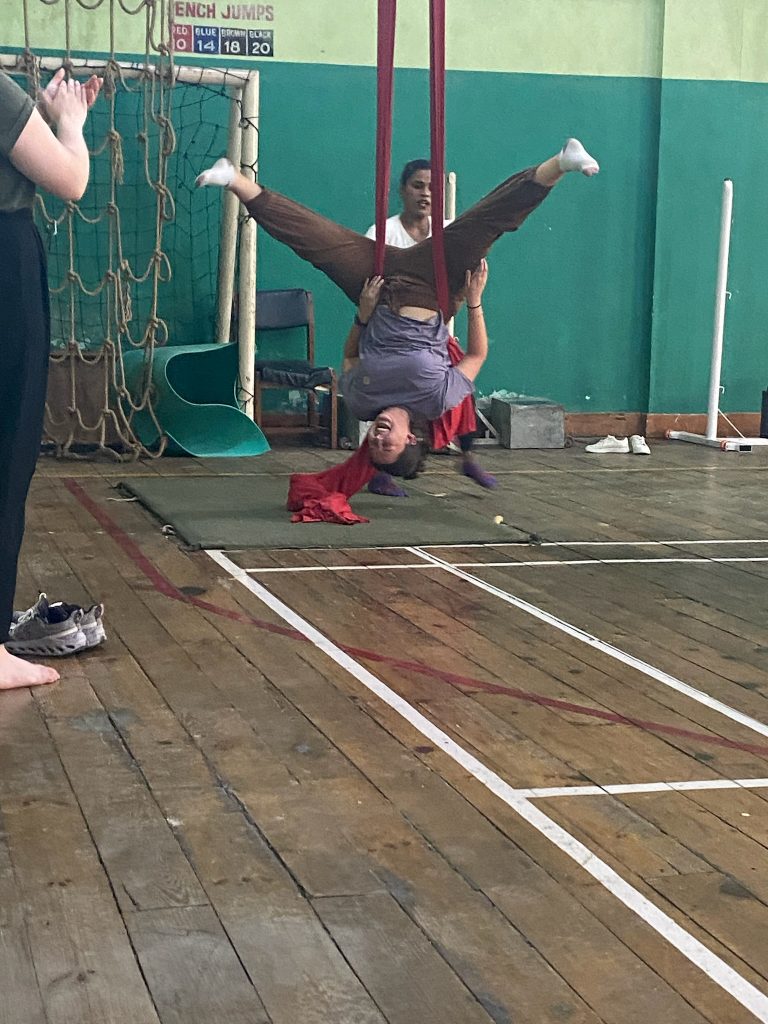
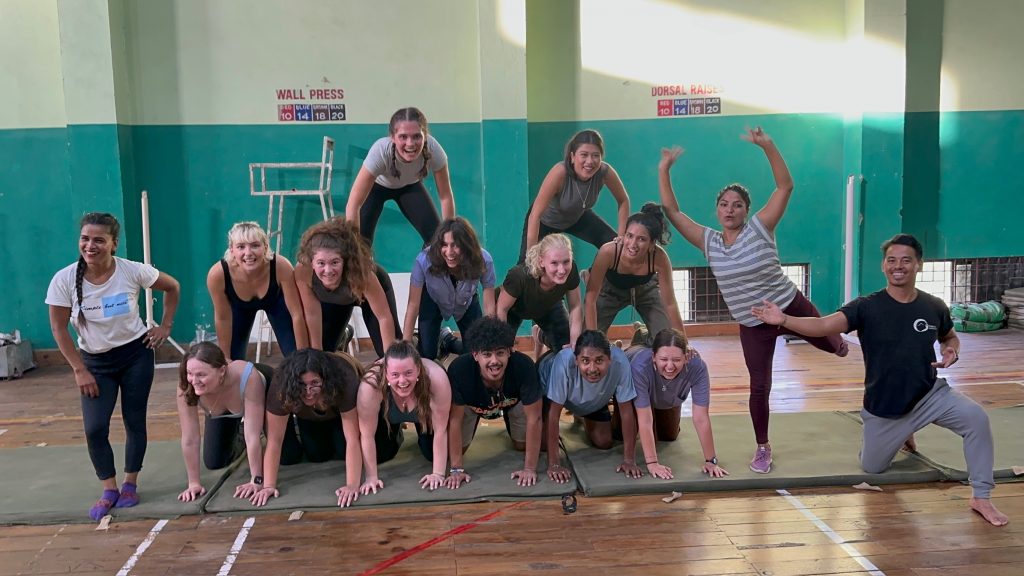
– – – – – – – – – – – – – – – – – – – – – – – – – – – – – – – – – –
Unfortunately, another rousing event that took place this past week was a terrible bout of food poisoning for me. As I laid in bed after dinner on Sunday night, I got that gross, impending-doom feeling that something was very much wrong with my stomach. By the time that 5 am rolled around, I had puked eight times and probably slept an hour total. Luckily, our program coordinators Krishna, Laboni, and Nirvana were at the ready Monday morning to help get myself and a few other students to the clinic- over the course of the week, many of my peers started dropping like flies with various ailments, so the clinic trips became routine for our team.
The best part about being sick was the motorcycle ride. Technically, riding on motorcycles is a “forbidden activity” for SIT students… but dire times call for drastic measures (mwa ha ha!). After puking one more time for good measure, Krishna picked me up and plopped me down on the bike behind him. He lowered the rider foot pedals and instructed me NOT TO TAKE MY FEET OFF OF THEM. He was about to take off when, at the last moment, he stopped the bike and started rummaging through his bag. “Here,” he said. “Can’t forget this!” He winked and handed me a blue baseball cap. I immediately started laughing. “Is this my helmet?” I asked. He said, “Yup!” And with that we took off, tearing through the ancient streets of Patan. Other bikes, brightly-clothed pedestrians, moving carts piled high with irregular pieces of lumber or bright green vegetables blurred past as as Krishna expertly maneuvered through the dynamic chaos of the Patan alleys. The wind felt SO good on my face… I grinned wildly in the rearview mirror which made Krishna laugh. He shouted over the wind, “I’m going to have to convince Yanik that this wasn’t your master plan all along!”
When we pulled into the clinic, reality resumed too soon. The ride had made me dizzy, and the heat was oppressive. Luckily, Nirvana greeted us there with water and led us into the vast, air-conditioned lobby. The hospital was luxurious, and Nirvana warned us that while the doctors first priority was to help us get better, they were also motivated to make as much money off us as they could while doing so. “You do not have to stay the night if you don’t want to. Don’t let them make you think that you are on death’s door just so that you end up here for a few more hours!” For me, it wasn’t fear mongering that made me want to stay… it was the ridiculously comfortable beds and the cool, quiet room they took me to. After giving blood and taking some anti-nausea meds, I slipped into a merciful, heavenly sleep in my quiet corner. When the doctors awoke me and said that I would not need to be rehydrated with IV’s, I was at once relieved and disappointed. It was time to leave this strange paradise and go home. Nirvana called me a cab and I bumped and jostled my way back to my homestay, where my host dad and sister were waiting to help me get situated in my room. They were so, so kind to me, as they always are, and they made sure I had water and crackers and as much air circulation as possible in our small room. When I returned to school the next day, I credited the motorcycle ride as what had cured me.
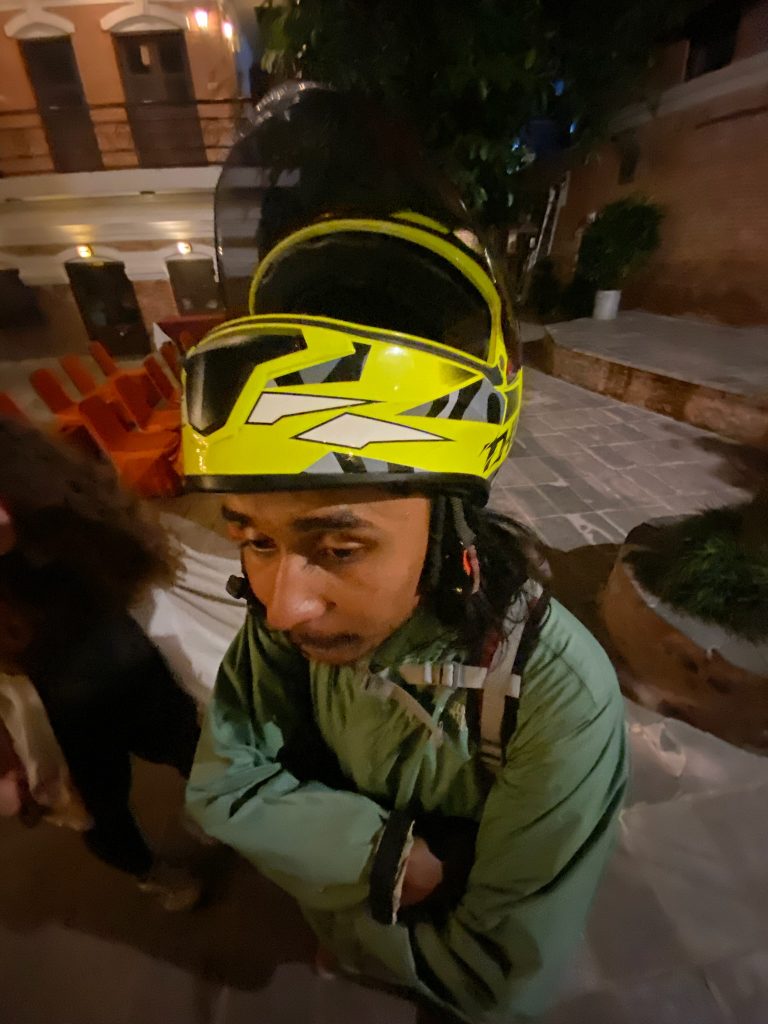
– – – – – – – – – – – – – – – – – – – – – – – – – – – – – – – – – –
I have much, much work to catch up on after the few days that it took for me to regain my full energy and brainpower, so I will write about just one more place that our whole student group visited this week. Two days after my bout of sickness, my peers and I all piled into a van and went to visit the International Office of Migration in Nepal- a special branch of the U.N. that has an office in almost every country all over the world. The IOM is an INGO that “promotes humane and orderly migration for the benefit of all… by providing services and advice to migrants and governments.” Before we arrived, I had assumed that the IOM would focus on serving both migrants and refugees in terms of labor migration, resettlement, and with the intake and care of both vulnerable populations. But when we began listening to our speaker’s presentations, we were informed that IOM Nepal focuses solely on the process of moving people through Nepal, and on providing for the needs of migrants during that specific, transient period. Apparently refugees and asylum seekers are the responsibility of the UNHCR (United Nations High Commissioner for Refugees) in Nepal.
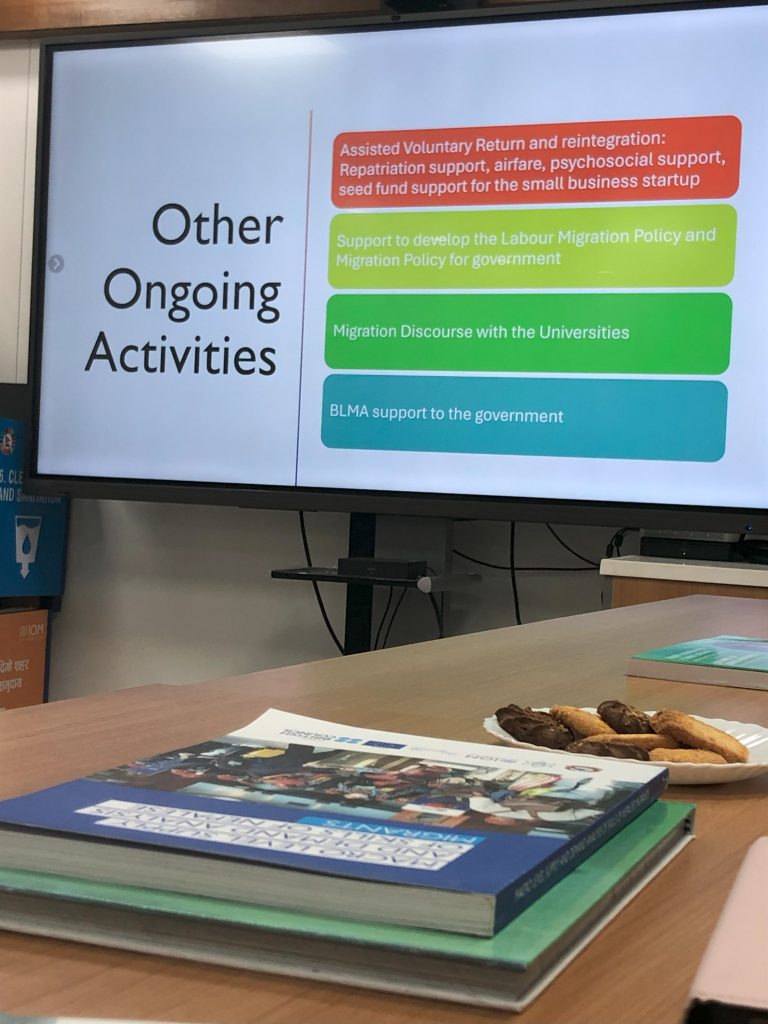
The first two floors of the IOM building smell like rubbing alcohol and look exactly like a hospital- performing health screenings and treating the medical conditions of migrants leaving Nepal are some of the IOM’s biggest priorities. The IOM works with nations in Europe, the U.S, Australia, New Zealand, and a few others to coordinate resettlement plans for documented Bhutanese, Middle-Eastern, Nepalese, etc. migrants that are in search of better lives. The key word here is documented- the status of being documented/undocumented makes all the difference in the kinds of resources that the IOM provides to migrants in Nepal. Documented migrants are given places to stay, basic healthcare, access to food pantries, and designated staff to help them plan their journeys and destinations. Undocumented migrants, however, are not legally eligible for IOM assistance, which creates a host of human rights issues for them. Based on our conversation, it was unclear as to whether the IOM or the UNHCR are able to provide any kind of direct aid to undocumented migrants, or whether this responsibility falls squarely on the shoulders of NGOs in Nepal. Either way, it seems problematic that such a large and vulnerable population of people in Nepal face such a dearth of resources and access to social services simply due to the status of their papers.
– – – – – – – – – – – – – – – – – – – – – – – – – – – – – – – – – –
This coming week, I will be traveling to the Terai region of Nepal! Specifically, our cohort will be going to Chitwan, a rural province of Nepal where rhinos roam and where tourism and development have created many environmental, social, cultural, and economic struggles and complexities. We will be speaking with two local NGOs in the community, one that serves and advocates for female survivors of domestic violence in the surrounding community (the problems created by the patriarchy and by gender-based-violence and power exist all over the world), and one that serves and advocates for foreign labor migrants and their families, who depend on the remittances that they send home. It will be such an honor and a privilege to see another side of life here in Nepal, and to have the opportunity to connect with members of a community that is so different from any other I have ever been a part of. I am very excited… stay tuned for more next week!
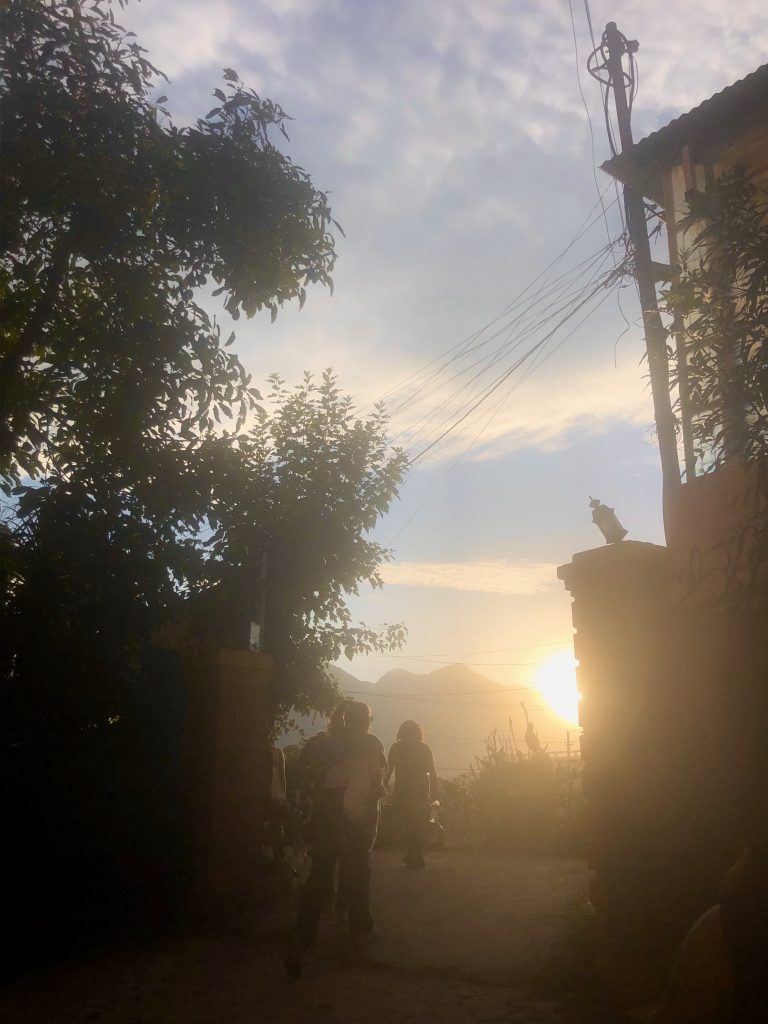
Posted in Uncategorized
Comments Off on Week 2 in Nepal – Sickness, the IOM, and Circus Kathmandu!

